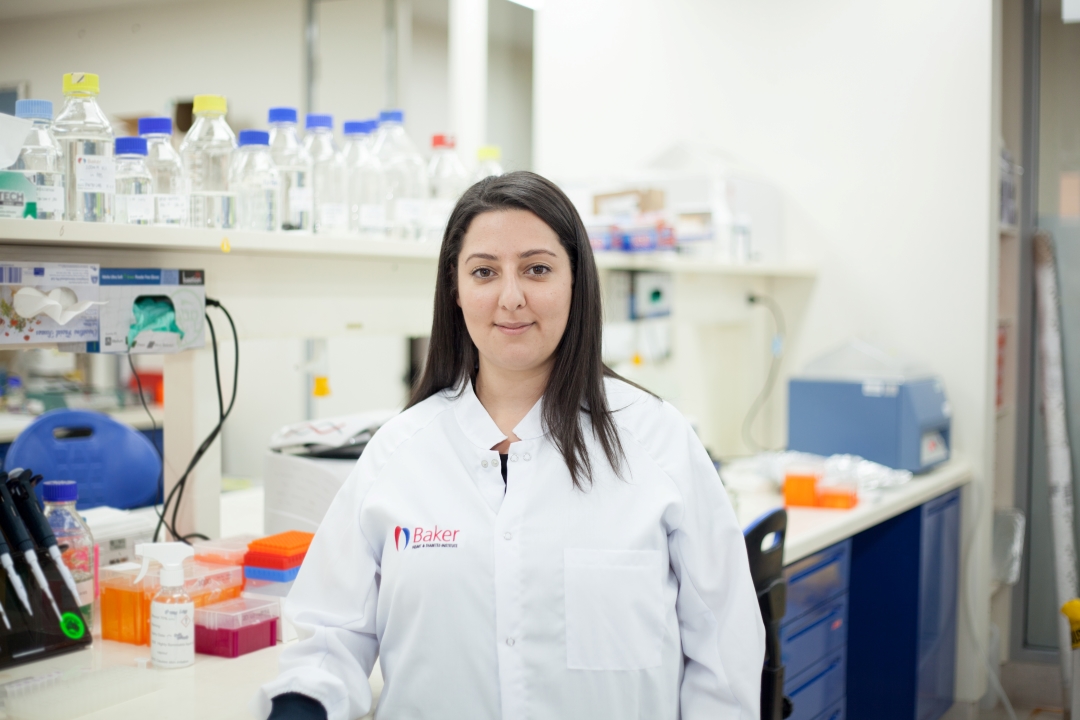Peter Mac placement launches Swinburne graduate’s STEM career

Gabriella Farrugia is enjoying working as a research assistant at the Baker Heart and Diabetes Institute.
In summary
- Gabriella Farrugia completed a one-year paid placement at the Peter MacCallum Cancer Centre while completing a Bachelor of Science at Swinburne
- Gabriella is now a research assistant at the Baker Heart and Diabetes Institute analysing healthy and unhealthy heart cells
- Gabriella says getting industry experience through work integrated learning during her degree developed her confidence and launched her career
Gabriella Farrugia has always been drawn to science.
‘Growing up I was that annoying girl always asking, “but why?”
‘I’m passionate about science because there’s almost always an answer – and if there isn’t one yet, you get to experiment, research, trial and get one step closer to knowing,’ she says.
Gabriella graduated with a Bachelor of Science majoring in Biotechnology and Chemistry at Swinburne, as part of which she completed a one-year paid placement in 2014. She has worked in science research labs since.
Gabriella enjoyed the way her studies allowed her to carry out experiments like real researchers, while having the safety net of teacher support and fewer time constraints.
‘Swinburne was my first choice, particularly because of their strong lab-based components and their connections with industry. Although a five-hour chemistry lab session might not be everyone’s cup of tea, I thrived in these practical sessions!’ she says.
Hands-on experience
Gabriella completed her placement during the third year of her degree at the Peter MacCallum Cancer Centre and was offered a role as a junior research assistant at the end of her experience.
Initially nervous about the job, Gabriella quickly realised how well prepared she was given the practical focus of her degree.
During the placement, Gabriella tested innovative drugs that would be used with radiation therapy to minimise the side effects. Each day, she tested the stability of compounds and analysed their effects on cells.
Gabriella says she loved the practical work and the experience helped her to develop her confidence.
‘As a student during placement and then as a junior research assistant, at times I felt I needed to make a bigger effort than expected to be noticed by colleagues outside my lab. My confidence in my work was restored when I was asked to work with an oncologist on his research. It made me feel recognised and proud of what I had achieved.’

Gabriella's current work involves conducting experiments to analyse heart cells
Exceeding expectations
Gabriella currently works as a research assistant within the Cardiac Cellular Systems Lab at the Baker Heart and Diabetes Institute within the Alfred Hospital.
She manages projects and conducts experiments to analyse how heart cells differ in healthy men and women, compared to those with any disease.
‘We employ cutting-edge technology involving 3D printing, microfluidics, and robotics, to allow us to interrogate the heart at a single cell level. Everyone in the team comes with a different set of skills and knowledge, and together we troubleshoot, innovate and learn.’
Alexander Pinto is laboratory head of Cardiac Cellular Systems at the Baker Heart and Diabetes Institute and says Gabriella does ‘outstanding work’ that exceeds expectations.
‘She is often the first to volunteer for an experiment that requires an individual to be present in the laboratory very early, late or on the weekend. Recently, she was at the laboratory at 5am on multiple occasions to ensure mice were prepared for experiments performed by other laboratory members.’
Trailblazing
As soon as she started her placement, it became evident to Gabriella that there was a lack of women working in STEM (science, technology, engineering and maths) areas, though she says this is improving.
Due to the culture of the research industry, there a few women in leadership roles as it ‘often comes at the expense of these amazing women not having a family’, she says. ‘We can encourage women to pursue STEM through using language such as “possessing leadership qualities” and “compassionate”.’
Gabriella hopes that women aspiring to a career in STEM will be ‘loud and proud’ of their passion and not have to sacrifice anything else they want in life.
‘I achieved this and so much more. With the right people working with you – you can’t go wrong.’
-
Media Enquiries
Related articles
-

- Technology
- Science
- Engineering
Victorian students drive green energy transition through international hydrogen competition
Swinburne’s KIOSC, in collaboration with Horizon Educational and Gippsland Tech School, co-hosted the Hydrogen Grand Prix in Melbourne.Friday 26 July 2024 -

- Science
Skin, scales and fish tails: using collagen to turn fish guts into gold
New research from Swinburne could transform the sector by converting high value collagen proteins from seafood by-products into cosmetics, food, and pharmaceuticals.
Tuesday 02 July 2024 -

- Science
- Engineering
Submarines in the future could self-identify cracks and self-heal thanks to Swinburne researcher
Thanks to the work of Dr Nisa Salim from Swinburne University of Technology’s School of Engineering, future submarines could self-identify microcracks and self-heal using a new kind of carbon fibre reinforced polymer composites.
Monday 17 June 2024 -

- Science
Inaugural Swinburne-CSIRO Indigenous Research Fellow joins national water quality forecasting project
Swinburne University of Technology has appointed spatial ecologist Associate Professor Sally Waller as its inaugural Swinburne-CSIRO Indigenous Research Fellow...
Thursday 13 June 2024 -

- Social Affairs
- Health
Swinburne leads world-first medical cannabis driving trial
Swinburne researchers are spearheading a world-first trial to evaluate whether patients can drive safely while on prescribed medical cannabis
Tuesday 28 May 2024

